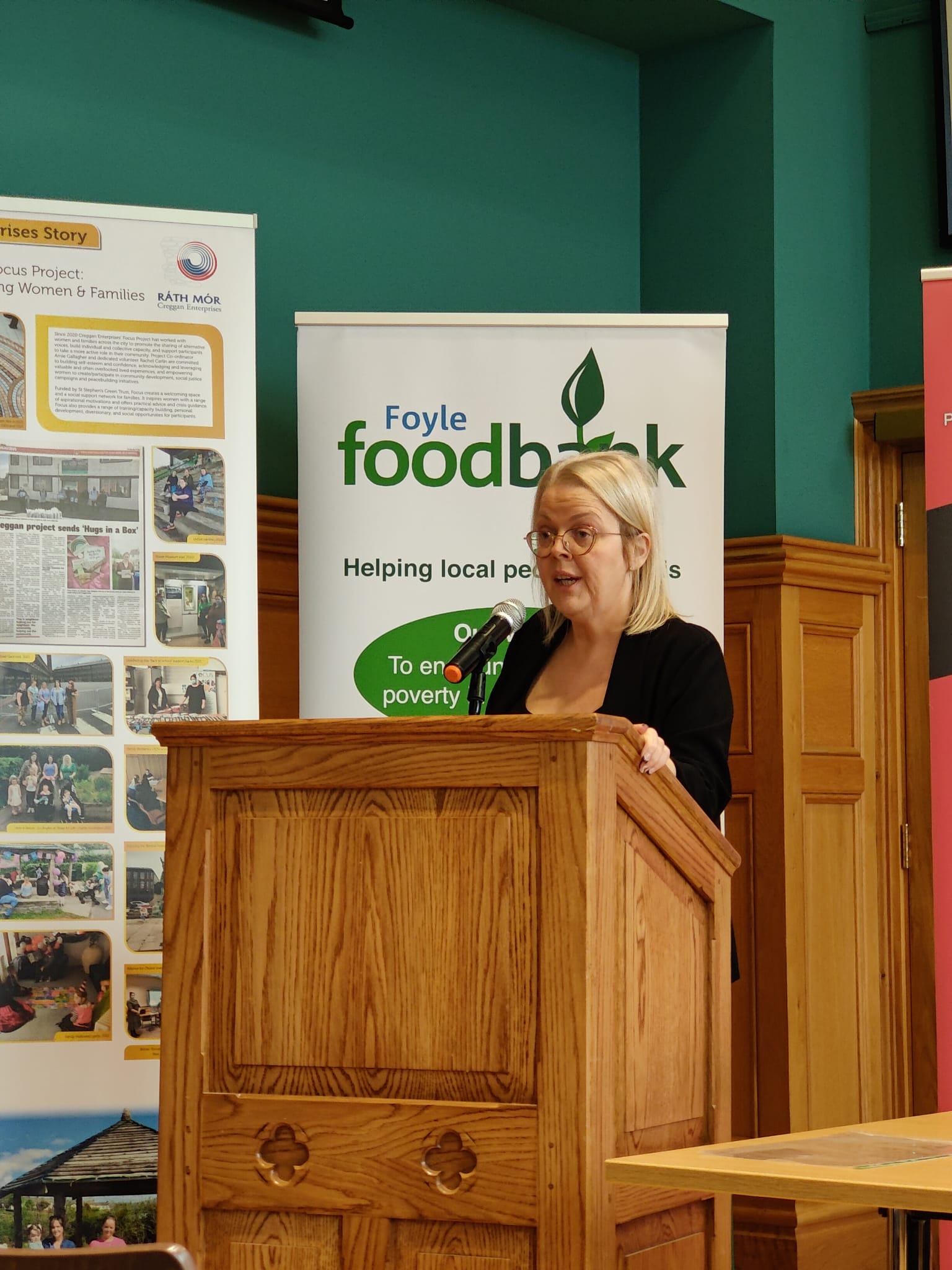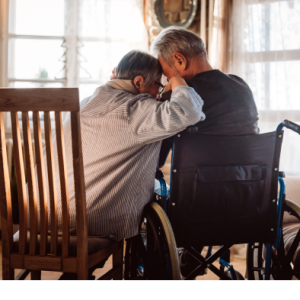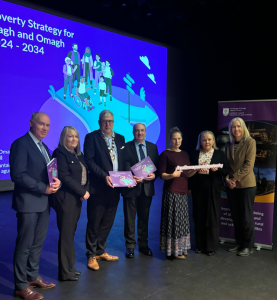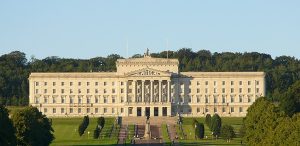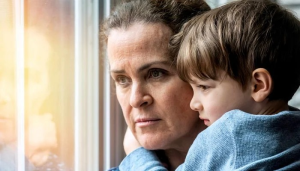Tackling Poverty in the North West
30 October 2023
By Rayna Downey
Rayna Downey is the Outreach Project Worker for the Women’s Regional Consortium based at the Women’s Centre Derry. Rayna gave this speech at the NIAPN event “Poverty is Political” for the International Day for the Eradication of Poverty.
I have been a worker within the Community & Voluntary sector for 23 years and I have witnessed many changes throughout the years, but to be honest, I have never seen the system as dire as it is right now.
Recovery from the Covid-19 pandemic was tough enough, now women are having to compete with the demands of a Cost of Living Crisis, private childcare fees, inflation, austerity, benefit reprofiling and caring responsibilities. These are just some of the massive barriers that women are currently facing. These families are experiencing a level of poverty they had never seen before and trying to keep their head above water is proving to be a Herculean task. Deciding between feeding your children or heating your home should not be a weekly choice that women are having to make, yet that is the reality that they find themselves in.
As the Women’s Regional Consortium has 7 Women’s Centre working together in Urban and Rural areas we can clearly see the challenges and the obstacles that women are facing. The consortium has carried out extensive research and their strategic approach has strengthened ties with Government and statutory agencies. The Consortium ensures that there is a continuous two-way flow of information and that organisations, centres and groups are made aware of consultations. They ascertain the needs, views and aspirations of women in disadvantaged and rural areas.
Community Support
When the Women’s Centre Derry began it was about offering women a safe place to learn and gain skills and qualifications, giving them the opportunity to participate in courses and have access to FREE childcare while they learn. This used to be enough support, but now that support has changed significantly. The needs that we are seeing from women now are for the basic essentials that families need just to survive. They need:
- Heat
- Electricity
- Food
- Clothes
- School Uniforms / Schoolbags / Supplies
- Nappies
- Formula
- Period products
- Baby Equipment
- Household Items
- Mental Health Support
- Counselling Services
All of these situations have created the perfect storm where women bore the brunt and became the shock absorbers of the poverty in their homes, they were forced into making tortuous decisions like skipping meals, watering down baby formula, selling their possessions just so that they could provide the essentials needed for their family’s survival. Children went to beds with their coats on in freezing homes because there was no money for heat, women ate nothing but leftovers from their children’s plates because there wasn’t enough food to feed them all. Now to be clear these I am not talking about luxuries here, I am talking about the very basic essentials that anyone of us needs to live a dignified life.
The Community and Voluntary sector have now become responsible for keeping these families from destitution due to a lack of Government and lack of funding. It has become the role of all community organisations to initiate and facilitate Social Supermarkets, Foodbanks, Breakfast Clubs, School Uniform Schemes, Winter Clothing Schemes, etc. We are constantly trying to access new avenues of support from self-fundraising activities to private donations to looking towards funding organisations outside N.I.
This is adding extra work to an already over-worked Community & Voluntary Sector, we are stretched to our limits and feeling the pressure immensely. The people of N.I have been abandoned by their Government to a system that is failing them in everyway possible, without proper support these women have no chance of changing these circumstances or moving past any of these barriers.
Childcare Support
We need a Childcare Strategy and affordable childcare system to allow women to go back to work. We need an improved benefit system allowing women to earn a wage while being supplemented with Universal Credit support. Women cannot return to the labour market without any of this support. At present a Full-time childcare place for 1 child costs between £1,000 and £1,200 per month, this is simply unaffordable for most families. Women are being forced to give up their jobs or take career breaks and stay at home because there is no other assistance or options available to them. They are literally being told that if you want to have children then you will have to sacrifice everything and stay home.

Against the backdrop of the Cost-of-Living Crisis squeezing already tight incomes, childcare costs have spiralled. Families in NI already experience difficulties affording childcare as there is no Childcare Strategy or Government funded childcare provision.
Working parents in England, Scotland and Wales receive up to 30 free hours of childcare per week for children aged 3 and 4. It was recently announced in the Spring Budget that 30 free hours of childcare will extend to children aged over 9 months from September 2025, but due to the lack of a functioning Executive, this will not apply to Northern Ireland.
Money Lending / Debt
As women’s incomes are generally lower over their lifetimes they are more vulnerable to short-term financial problems or income shocks making them more likely to have to rely on borrowing and debt to make ends meet. Within the Derry City & Strabane Council area the ‘Need for Debt Advice’ is 17.7%, these are the highest figures across all council areas, also people within the Derry City & Strabane council area also have the lowest credit score rating of all the councils, meaning the credit need is likely to be higher and people are less likely to have access to fair and affordable credit which is restricting their access to credit.

This leads to many of these women having no choice to resort to borrowing from Illegal Money lenders such as Door-step lenders or Paramilitary Lenders. This type of lending is very prevalent in N.I however it remains a hidden issue due to the underlying fear and secrecy surrounding this type of credit. It has Extortionate Interest rates and Higher repayments than Banks or Building Societies. For Example, borrowing £500 means you pay back £800. A lot of the community groups are reporting that this is becoming a significant issue with women now, they are embarrassed to find themselves trapped in poverty and ashamed to seek help to try and resolve it.
Benefits/Discretionary Support
During the Covid-19 pandemic the Government temporarily increased Universal Credit by £20 per week as an acknowledgement that benefits levels were too low and needed to be higher to meet recipients’ basic needs. This was essential support to women and children who particularly vulnerable to financial stress as they are on low level benefits.
I did a small experiment back then to see how far £20 could go, so I created a shopping list with a £20 budget from a well-known supermarket, 2 years later that I did that exact same shopping list and it now costs £7.80 more.
When this payment was removed those most in need felt a significant blow, they had lost the security that this small increase provided to them and their families. Although £20 does not seem like a lot of money it equaled an extra £960 per year to these families. As the cost of living of crisis was increasing at a weekly rate it provided a small amount stability for these families.
Legacy Benefit recipients such as those who received Carers Allowance, Income Support, Personal Independent Payments, and Tax Credits did not receive any extra financial support as they didn’t qualify for the uplift, a large proportion of families found themselves excluded and suffering financial hardship as a result of the Cost of Living increases.
Discretionary Support, Universal Credit Contingency Fund and the Advisor Discretion Fund provided support to those suffering financial hardship and enabled women to access much needed funds to cover the 5-week waiting period when signing onto Universal Credit or pay upfront childcare costs or short-term financial support for people in severe financial hardship. Recent budget cuts to these much-needed financial support systems is going to impact on women and children significantly.
Working Poor/Poverty
There is a lot of frustration from women who work within this structure as well, as they feel that they are not supported by the system. Many women are in low-paid work and struggle to make ends meet on low incomes, often without any access to support with their bills. They noted that there is a significant lack of financial support available to working families. Given the significant rise in inflation (approximately 10% in October 2022) and cost of living pressures, those in low-paid employment struggle to balance budgets. The Household Expenditure Tracker, developed by the Consumer Council Northern Ireland, in partnership with the Centre for Economics and Business Research, has shown that those on the lowest incomes had just £29 per week left after paying bills and other living costs. Between January-March 2022, the lowest earning households saw their income grow by only £0.27; yet spending on essentials rose by 3.5%, discretionary income fell by 18.5%, and the average gross household income in Northern Ireland remained 11% lower than the rest of the UK.

These families are finding it impossible to pay their bills, buy fuel, food, gas, electricity, clothing etc. The constant rising costs from energy suppliers, mortgage increases and ever-changing costs in supermarkets have made it almost impossible for working families as well. Many find themselves using credit cards to replace white good Items in their home or help with car repairs. These families didn’t qualify for the one-off Cost of Living payments that were being given out by Government to help alleviate some of the financial pressures. Being in employment does not guarantee a better standard of living. Poverty is poverty. A lot of these working families are accessing food-banks and community groups for support because once they pay their bills they have no money left for essentials.
BAME / Migrant and Asylum Seekers
Right now, we are seeing a significant increase in BAME & Migrant women coming into the Centre. We currently have 63 women from 26 different countries registered at the Women’s Centre. These women are facing significant barriers and challenges everyday they have very limited resources or sometimes no resources, language barriers and isolation. They have limitations attached to their visa’s disqualifying many of them from gaining employment or accessing the benefit system. These families want to have the dignity of earning their own money to be able to provide for their families.

Community Groups have been essential in providing services for these women, we have assisted them with registering for schools, doctors and dentists, completed school meal applications, school uniform applications and provided clothing, baby items, food vouchers, household items, and school uniforms. We are working tirelessly to help to those who do not have access to government assistance to ensure that they are able to integrate into the community and gain positive experiences. These women and children are scared. They have relocated their entire lives and some have experienced severe trauma on their journey here. Providing them with a safe space, and allowing them to gain skills, establish friendships access counselling services is a privilege for us.
Money and Mental Health
Women consistently said that their mental health was severely impacted and they were more anxious about paying their bills, and feel depressed about the Cost-of-Living Crisis, while worrying about household costs. The women said that worrying about money was impacting their lives on every level and they are more concerned about being able to pay bills over the coming year due to the constant increases.
We know that living in poverty and having money worries and stresses impacts on your mental health. Many women said that they aren’t sleeping much at night because they can’t stop worrying about how they are going to cope or how they are going to feed their children. You cannot have good mental health while living in poverty.
Right now, the buzz word being used is ‘well-being’, but how can you ensure someone’s well-being when they have haven’t enough heat, electricity, money or food. When they can’t do anything self-care Related, fun or healthy because it simply costs to much. We all know that there are 7 pillars to self-care and well-being but when you live in constant poverty, it’s almost impossible to achieve any of these pillars as you are already limited about what you can afford to access.
Everyone sitting in this room knows we all are right now without a functioning Assembly. We cannot keep going like this. The people of Northern Ireland need and deserve more. This town is at breaking point due to a significant lack of services and funding, and we cannot rely on the community sector to bear this entire burden. I know that we love being part of the Community & Voluntary sector and I’m sure that you know that we don’t take a job in this sector because of its high-flying wage packets. We do it because we believe in the work and we want to support our communities and give them the best possible chance of survival.
Everything that I have talked about here today is either first hand experience or from focus groups that we facilitated, I have also referenced information from the amazing and detailed Women’s Experiences of the Cost-of-Living Crisis in Northern Ireland Report written by the fantastic Siobhán Harding, Women’s Support Network, Dr Ciara Fitzpatrick, Ulster University & Dr Alexandra Chapman, Ulster University. This 98 page document gives you a better insight into these subjects than I ever could!
Thank you.


